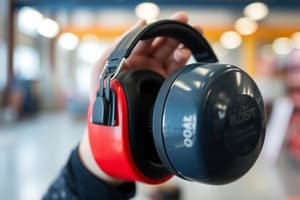Podcast
Questions and Answers
What causes sound to be produced?
What causes sound to be produced?
- When something compresses
- When something cools down
- When something vibrates (correct)
- When something glows
Which of the following is not a way to make sound?
Which of the following is not a way to make sound?
- Singing (correct)
- Striking
- Plucking
- Blowing
Which part of the ear vibrates in response to sound waves?
Which part of the ear vibrates in response to sound waves?
- Middle ear
- Eardrum (correct)
- Outer ear
- Inner ear
How do sound waves travel in the air?
How do sound waves travel in the air?
Which state of matter allows sound to travel the fastest?
Which state of matter allows sound to travel the fastest?
What is sent from the ear to the brain to help understand sounds?
What is sent from the ear to the brain to help understand sounds?
Which part of the ear is responsible for hearing?
Which part of the ear is responsible for hearing?
What is the main function of our ears besides hearing?
What is the main function of our ears besides hearing?
What happens to sound as sound waves move outward?
What happens to sound as sound waves move outward?
In which medium do sound waves travel the fastest?
In which medium do sound waves travel the fastest?
Which of these actions is recommended to protect your ears?
Which of these actions is recommended to protect your ears?
What should you do if you have an earache?
What should you do if you have an earache?
How do sound waves affect molecules?
How do sound waves affect molecules?
Which statement is true about hearing disability?
Which statement is true about hearing disability?
What is NOT a recommended ear care practice?
What is NOT a recommended ear care practice?
Why are two ears better than one in locating sound direction?
Why are two ears better than one in locating sound direction?
What is the unit for measuring sound volume?
What is the unit for measuring sound volume?
What can cause damage to your ears?
What can cause damage to your ears?
At what decibel level does immediate danger to hearing occur?
At what decibel level does immediate danger to hearing occur?
How long can you be exposed to 110 decibels before risking hearing damage?
How long can you be exposed to 110 decibels before risking hearing damage?
Which of the following is a correct example of ear care?
Which of the following is a correct example of ear care?
Which sound would likely require the use of ear protectors?
Which sound would likely require the use of ear protectors?
What is one suggested method to protect hearing in noisy environments?
What is one suggested method to protect hearing in noisy environments?
What is one use of sound mentioned in the content?
What is one use of sound mentioned in the content?
Flashcards
Sound Production
Sound Production
Sound is created when something vibrates.
Sound Waves
Sound Waves
Sound travels through the air in waves that push air molecules.
Eardrum
Eardrum
A thin membrane in the ear that vibrates when sound waves hit it.
Hearing Process
Hearing Process
Signup and view all the flashcards
Outer Ear
Outer Ear
Signup and view all the flashcards
Middle Ear
Middle Ear
Signup and view all the flashcards
Inner Ear
Inner Ear
Signup and view all the flashcards
Sound speed in Solids, Liquids & Gases
Sound speed in Solids, Liquids & Gases
Signup and view all the flashcards
Healthy Ear Care
Healthy Ear Care
Signup and view all the flashcards
Ear Damage
Ear Damage
Signup and view all the flashcards
Decibel (dB)
Decibel (dB)
Signup and view all the flashcards
Loud Sounds & Damage
Loud Sounds & Damage
Signup and view all the flashcards
Noise Protection
Noise Protection
Signup and view all the flashcards
Sound Use - Communication
Sound Use - Communication
Signup and view all the flashcards
Sound Use - Music
Sound Use - Music
Signup and view all the flashcards
Hearing is remarkable
Hearing is remarkable
Signup and view all the flashcards
Sound & Distance
Sound & Distance
Signup and view all the flashcards
Sound speed & molecules
Sound speed & molecules
Signup and view all the flashcards
Hearing Loss Causes
Hearing Loss Causes
Signup and view all the flashcards
Hearing Protection
Hearing Protection
Signup and view all the flashcards
Ear Problem Care
Ear Problem Care
Signup and view all the flashcards
Hearing Impaired
Hearing Impaired
Signup and view all the flashcards
Ear Protection
Ear Protection
Signup and view all the flashcards
Study Notes
Primary 3 General Studies Unit 2
- Unit Title: The Wonder of Heat and Sound
- Unit Dates: 2024-2025
Sound Production
- Sound is produced when something vibrates
- Four ways to create sounds: plucking, blowing, stroking, striking
- Sound waves cause air molecules to vibrate, causing the eardrum to vibrate, allowing us to hear.
How People Hear
- Three tiny bones vibrate within the ear
- Eardrum vibrates
- The brain "understands" the messages
- Outer, middle, and inner ears are involved
- Nerves send messages to the brain
Sound Travel
- Sound travels in waves in all directions.
- Sound waves travel faster when molecules are closer together (solids) and slower when they're farther apart (gases).
- Sound waves can travel through solids, liquids, and gases.
Protecting Your Ears
- Loud noises can damage hearing.
- Always cover ears when exposed to loud noises
- Wash ears regularly and dry thoroughly.
- Seek medical attention for earaches or blocked hearing.
- Hearing problems can arise from birth or occur later in life.
Measuring Sound
- Decibels (dB) measure sound volume
- Loud sounds (e.g., a gunshot, jet engine) cause immediate hearing damage.
- Different sounds have different levels measured in decibels
- Ear protection is recommended in noisy environments.
Uses of Sound
- Communication: Telephones, electronic devices transmit sound as electricity
- Music: Different instruments produce sounds through vibration
- Sonar: Marine animals and humans use sound waves to navigate, locate objects, and find food.
- Ultrasound: High-frequency sound waves used in medical imaging.
Studying That Suits You
Use AI to generate personalized quizzes and flashcards to suit your learning preferences.




